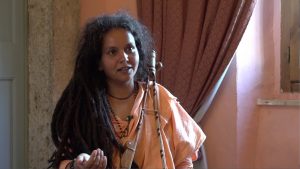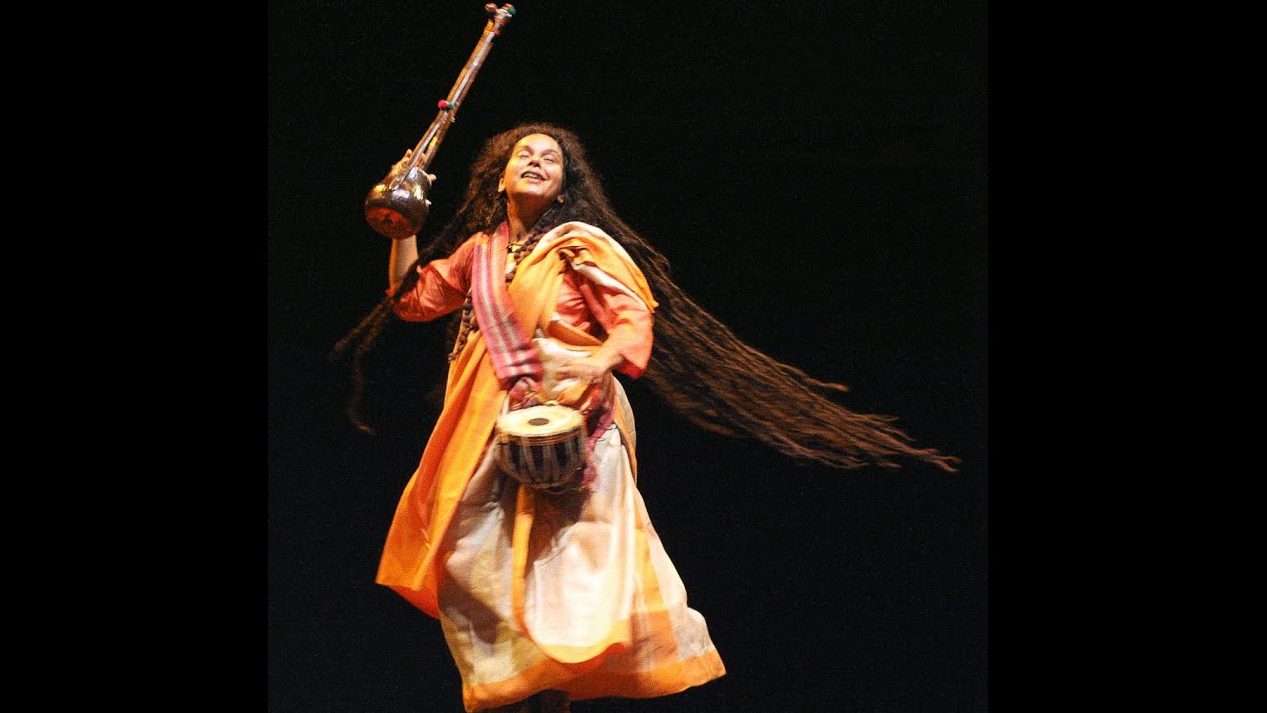Love versus hetero-patriarchy
The celebration of transgressive love or parakiya prem spread in India with the songs of Bilwamangal, the blind poet of Vraja who sang of Radha’s love. The writings of Bengal’s Vaishnava tradition from Chaitanya onwards further developed the concept of serving Radha in the role of her handmaiden, a feminine attitude that many male poets and devotees readily adopted. Thus Chaitanya was thought of as Radha herself, and his disciple Rupa Gosvami became Rupa-manjari, her devoted maid. This gender-fluid love that transcends all social restrictions is celebrated even in modern times. In the late nineteenth century, in Girish Ghosh’s Chaitanya Leela the role of Chaitanya absorbed in the mood of Radha was performed by Noti Binodini – a gender-transgressing performance that moved otherwise orthodox audiences to ecstasy.
In recent times, “Radha” was part of several hashtags on social media used by students to protest against the targeting of women by the moral police. Today, almost everybody has hummed or at least heard songs that invoke Radha’s love by artists like Anusheh Anadil and Sahana Bajpaie. In the villages of Bengal, Odisha, Assam, Manipur and Tripura, the stories of Radha are still sung as a celebration of a love that defies caste and creed. The traditional songs of Radha are kept alive in Bengal and Bangladesh by the bauls, fakirs, folk singers and practitioners of padavali kirtan. At a time when questioning of hetero-patriarchal control is an important part of public discourse, the centuries long tradition of Radha-bhaav provides an emancipatory philosophical frame. All of the many traditions in India that have told of Radha’s love are brought together masterfully by the genius of Parvathy Baul in her solo musical, Radhabhab.
Radha in India’s syncretic traditions
The tradition of kirtan, which Sri Chaitanya popularized as a means of mass education against gender and caste discrimination enriched the songs of the bauls in Bengal. Bauls and fakirs have stressed not on Brahminical scriptures but on love, not on the orthodoxy but on the dil-quran. There are many Sufi songs that invoke Radha’s love as the typology for the love of the individual for the murshid or Allah. The syncretism enabled by sheer love has been most eloquently brought to audiences around the world by the pre-eminent woman Baul of our time, Parvathy Baul. According to her, Krishna is imagined as the eternal truth or the universe, and Radha as the seeker longing to merge with this – an analogy that can be adapted to many religions. Her baul guru Sri Shoshanko Goshai emphasized the importance of Chaitanya’s teachings, and her ability to connect with the masses is a continuation of Chaitanya’s emphasis on mass contact and mass education through music. Her ability to connect with her audiences is legendary, as anyone will testify who has seen her perform at gatherings like One Billion Rising, Sahaj Parav and Ruhaniyat. She has performed in over forty countries, in many prestigious concerts and festivals.
The baul tradition, which represents a coming together of Vaishnav, Sufi, Buddhist and many other folk traditions of music is a living testimony to the capacity of Indians for cultural and spiritual harmony at the grassroots level. Parvathy Baul’s way of life is the path of sahaj, the natural expression of the joy of being. Given that Chaitanya emphasized love as well as non-violent resistance, it is easy to understand why Parvathy Baul’s music appeals to a generation which is in search of deeper insight and moved to protest against injustice. In the present atmosphere of rising intolerance, it has become more important than ever to highlight and celebrate the music and philosophy of love. It is therefore apt that Parvathy Baul should perform her solo musical Radhabhab in these turbulent times, as a reminder that people’s bigotry can be changed is through love.

About Parvathy Baul’s Radhabhab
While many have heard her perform songs of dehatattva, Kabir, and other mystical traditions, it is a rare treat to see her perform Radhabhab, her greatest exposition on the love of Radha, in all its moods. Radhabhab is a unique form that she has named chitra katha geeti, merging folk painting, storytelling, theatre, dance and brilliant songs to tell of Radha’s unconditional love, all set against the vivid backdrop of her acrylic paintings inspired by patachitra.
Parvathy Baul created Radhabhab inspired from the story Kaliya performed by her guru Sri Sanatan Das Baul. She had learned Kaliya from him, and later drew on her training in dance, theatre and art to create her masterpiece. As she learned more about the baul path from Sri Shashanko Goshai Baul and others, she added more layers to her interpretation of the eternal love story of Vraja. From the earliest performances of Radhabhab in 2000, her performance has evolved, and grown in complexity.
After a long gap of several years, Parvathy Baul performed the musical in Kolkata in December 2019 at the Nandikar Theatre Festival. Eminent theatre critic Professor Ananda Lal has said of her performance: “Parvathy Baul’s electrifying 90-minute nonstop solo singing in Ekathara Kalari’s Radhabhab, of traditional Krishna lore learnt from Sanatan Das Baul, is an experience that cannot be missed. Not only does her voice never falter, and her stamina and energy never flag, but her range of musical styles from semi-classical to Vaishnav devotional to grass-roots folk is rarely heard in one individual.”
Audiences can catch her perform Radhabhab live at Madhusudan Mancha on 1st February at 6 pm. The proceeds will go to support the work of Vivek Vani Shiksha Kendra and the BASICS trust in meeting the educational and health needs of underprivileged children and youth. It is perhaps apt that the BASICS trust, by organizing this celebration of baulgiti and kirtan, will be commemorating the birth centenary of its founder, eminent freedom fighter and social reformer Acharya Gour Ganguly. He had effectively used these forms of music for mass mobilization in his satyagraha against violence on refugee women in Tripura and to break down caste prejudice.
A musical note – on borders, immigration and refugees
One could well imagine Sri Chaitanya, the saint who introduced music as a means of mass mobilization against prejudice, as an icon for the present resistance to “fixing” citizenship. His parents were “immigrants” who came from east Bengal to Nabadvip. These immigrants resisted persecution and bigotry in their new home in Nadia with the only non-violent means they had, nagar kirtan – the music of love. Chand Kazi, the administrator who had tried to prevent them from practicing their devotional music, eventually became a friend of the Vaishnavas of Nadia. Even today, at the grave of Chand Kazi, the Quran is read and kirtans are sung under the shade of the same champa tree. The tradition of people moving from one part of undivided Bengal to another goes back centuries, as does the tradition of dialogue and syncretism. Even after the Partition and 1971, the borders of Bengal have remained permeable in every sense. Some of the greatest modern exponents of Chaitanya’s kirtan tradition including Chhobi Bandopadhyay were themselves “immigrants” and “refugees” from opaar Bangla. It is important to remember this long history of regional migration and cultural traffic when trying to make sense of the resistance of people in Bengal to forced registrations of citizenship. The music of baul, fakir and kirtan traditions knows no borders, and never will. Parvathy Baul’s performance of Radhabhab on February 1 will celebrate precisely this diversity in the language of love.
[Tickets for Parvathy Baul’s Radhabhab on Feb 1 at Madhusudan Mancha, 6 pm can be purchased from:
BookMyShow: Click here
PayTM Insider: Click here
Offline tickets can also be purchased from: Golpark: Melody, Whisteling Kettle, Dakshinapan: Dolly’s Tea, Khadi Silk Emporium, Near Rashbehari Crossing: Melody, Mudiali: Café Calcutta, Beside Acropolis Mall: Le Café Seine, Salt Lake: Café Courting Coffees. For donor passes contact 9836391604, 8335802810, 9051938474]


Comments are closed.